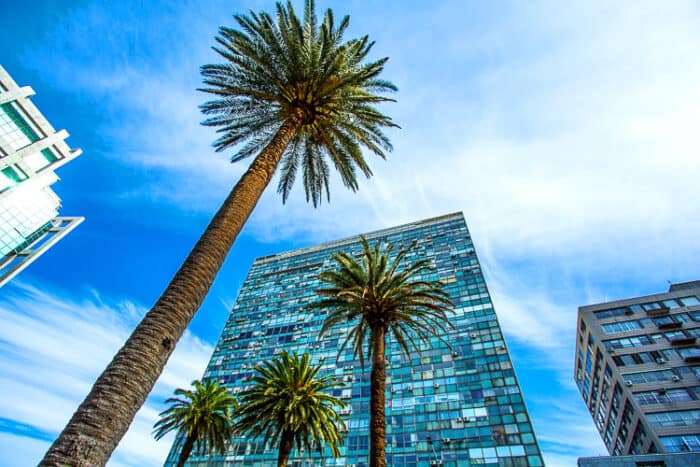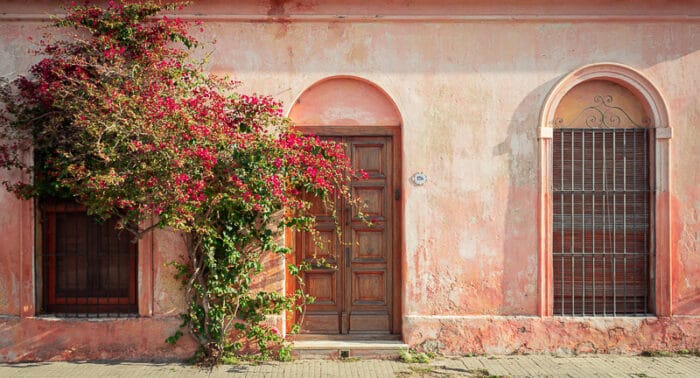Ranking high as one of the safest, most advanced, and economically stable countries in Latin America, Uruguay is a dream come true for Expats. Whether you’re looking for a slice of heaven for retirement or moving to Uruguay for work, we’re here to make the relocation process easier.
From visa and residency requirements to healthcare, real estate, and the job market, this guide will help you figure out all your options as you make the big move to Uruguay!

Why Expats are Moving to Uruguay
Uruguay has a stabilized economy, technologically advanced infrastructure, affordable healthcare, a pleasant climate, friendly locals, heavenly beaches, and much more besides!
Residency and citizenship in Uruguay are comparatively easy, with options for many people. The country also has a relatively low crime rate and is considered one of the safest places to live in South America. Living in Uruguay has opened up a new world of possibilities for many Expats.
How to Move to Uruguay Legally
Getting a Visa for Uruguay
Whether you’re merely visiting Uruguay or planning to apply for residency, the first step is to explore your visa requirements. Uruguay allows visa-free entry for around 85 countries for up to ninety days (unless the conditions say otherwise). These countries include EU member countries, the United States, and Australia. Citizens of other countries have to apply for a visa from their respective Uruguayan embassies.
- Tourist Visa – This visa is for travelers and vacationers simply passing through Uruguay on a trip. The visa is valid for ninety days and multiple entries.
- Business Visa – Expats who want to set up or expand their business in the country may require a business visa that lasts ninety days and offers multiple entries.
- Work Visa – A work visa is for foreign employees visiting Uruguay for work purposes. This permit lasts for thirty days and a single entry. Employees who wish to continue working beyond one month need to apply for residency within thirty days of entry.
- Retirement Visa – Retirement visas do not have an income requirement and allow you to bring your vehicle duty-free to Uruguay.
Other types of single-entry and thirty-day visas include:
- Family reunification
- Student or Study
- Humanitarian and emergency
In most cases, your passport needs to be valid for a minimum of six months beyond your stay in Uruguay.
General Visa Requirements
You need standard documents for the visa application process, including the application form, a valid passport, travel tickets, medical certificate, proof of income, etc. If you’re applying for a business visa, you may need additional documents like a letter from the company and references.
After the paperwork is completed, applicants should prepare for an interview that will involve questions about their visit to Uruguay. The visa processing can take anywhere from fourteen to twenty business days, and the application fee depends on your nationality.
Applying for Residency in Uruguay
Why become a Resident of Uruguay?
You should apply for Uruguayan residency if you want to:
- Live and Work in Uruguay – Want to keep living and working in Uruguay for the long haul? Applying for residency will open up a lot of opportunities for you.
- Import Household Possessions Duty-Free – You can import your home furniture and other possessions duty-free to Uruguay when you become a resident.
- Become a Citizen of Uruguay – Applying for residency is the first step toward getting Uruguayan citizenship.
Residency Applications Requirements
Tourists to Uruguay can apply for residency without having a job or work contract. All you have to do is visit the immigration office in Uruguay with the necessary documents. These documents may include your notarized birth certificate, marriage certificate, proof of income ($1,500 per month for one person), and a police certificate from your resident country.
Getting a Temporary Resident ID and Residency Approval
Once you’ve submitted all the paperwork, you’ll become a temporary resident of Uruguay. This status grants you a temporary cédula or Uruguayan ID card from the Dirección Nacional de Identificación Civil (DNIC) until your residency application is approved.
The final approval can take anywhere from one to two years, but once it’s approved, you’ll receive all the documents needed for a permanent cédula.
How to Open a Bank Account in Uruguay
You might need to set up a Uruguayan bank account to show proof of income during the residency process. A bank account will also help you manage your finances in your new home country. Here are some standard requirements for setting up a bank account in Uruguay:
- Passport
- Driver’s License or other ID
- Proof of residence, for example, Utility Bills
- Proof of income
- Reference from an Uruguayan resident such as an attorney
How to Apply for Citizenship
After becoming a permanent resident, the next step is obtaining citizenship. To become a citizen of Uruguay, you need to be a resident for five years if you’re single and three years if you’re married or have a family. General documents like a birth certificate, permanent resident certificate, proof of identity, proof of income, etc., will be required for the application.
Unlike some other countries, such as Paraguay, Uruguay imposes strict physical presence requirements. The immigration officials expect you to be present in Uruguay for at least six months to qualify for citizenship. However, by investing in a business or real estate in Uruguay, you can get tax residency which only requires sixty days of physical presence per year.
The citizenship application takes almost six months to process. Uruguay allows multiple citizenships, so you are not required to give up your previous nationality to become a Uruguayan citizen.

Finding a Home in Uruguay
Expats have the freedom to buy, sell and own property in Uruguay even without citizenship. You don’t even need a tax identification number or local partners to have a property to your name.
Furthermore, the real estate market can feel familiar for US citizens as properties are usually bought and sold in USD due to rapid fluctuations in Uruguayan pesos.
Some of the most popular types of real estate in Uruguay include:
- Apartments in cities like Montevideo
- Apartments in beach resorts like Punta del Este
- Single-family homes in resorts or coastal towns
Best Places to Rent and Buy Property in Uruguay
Uruguay’s property prices heavily depend upon the region, type of property, utilities, and other considerations.
Here are some of the most popular cities and towns where Expats are renting and buying properties:
Montevideo
Out of 3.5 million Uruguayans, 1.4 million live in the capital Montevideo which offers multiple neighborhoods with a high standard of living. The city rivals major cosmopolitan capitals around the world with its vibrant nightlife, unparalleled beaches, and first-world amenities.
Naturally, prices in the Montevideo area have been rapidly increasing with the growth of upscale developments along the Rambla. In 2018, the average cost of newly built properties rose 0.7 percent after factoring in inflation and the decline of the Uruguayan peso.
Expat-favorite neighborhoods in the city include:
- Pocitos for a modern, luxurious apartment lifestyle.
- Ciudad Vieja and Centro for properties with late nineteenth-century neoclassical and art deco architecture cost less than Pocitos.
- Cordón for revitalized apartment areas.
Punta del Este
Once a seasonal summer resort, Punta del Este is now a year-round residence for many Expats. From vacationing celebs to middle-class residents, this indulgent beach-side destination is home to people from all walks of life. The real estate scene is quite diverse, with many multimillion-dollar apartments at prime locations and more affordable properties scattered throughout. All in all, Punta is considered one of the most expensive places to live.
Maldonado
For those looking to experience the beauty of Punta del Este at a much lower cost, the area of Pinares in Maldonado is the perfect location.
Apart from these common areas, Expats are also settling in small coastal towns like Atlantida, La Paloma, and Piriapolis. Some of the new developments in these coastal neighborhoods can cost anywhere from $2,000 to $4,500 per square meter.
Where to Find Real Estate Opportunities in Uruguay
Uruguay does not have a multiple listing service, making it hard to keep track of real estate prices and find new opportunities. To keep an eye on properties and listings, you can seek help from local real estate websites, newspaper classified ads, or real estate offices.
You should also look out for “For Sale” signs in the areas you’re interested in. Another way to stay updated is through word of mouth from the Expat community and local friends in the region.
The Healthcare System in Uruguay
Depending on your budget and medical requirements, Uruguay offers both private and public healthcare. There are around fifty-six public and forty-eight private hospitals and a university hospital with the most experienced doctors in the region.
Healthcare facilities are readily available, especially in urban areas. The hospitals have competent staff, reasonable waiting times, and are well-equipped. Perhaps the biggest drawback for Expats is that most doctors don’t speak English. The British Hospital in Montevideo is an exception where most doctors and staff are comfortable speaking English.
Here are some healthcare options for Expats and citizens of Uruguay:
- Mutualista Plan – Most Expats go for the Mutualista plan that connects them to a private hospital. Members can get high-quality medical care from the chosen hospital with a monthly fee of around $100 to $150 plus small copayments. The Mutualista plan cannot be considered health insurance as it functions differently. However, the plan has age caps and restrictions for certain pre-existing conditions.
- Public Healthcare – Uruguay’s public healthcare is free for low-income citizens under the Fondo Nacional de Salud. Expats can access the public healthcare system if they have their cédula or ID card.
You can also use Expat health insurance as global health insurance, but most people in Uruguay find the Mutualista plan or public healthcare to be adequate.
Working in Uruguay
While living in Uruguay, finding the ideal job opening might be challenging. The salary is lower than expected, Spanish fluency is preferred, and there’s a lot of competition from locals.
However, Uruguay is known for its business-friendly and technologically advanced job sector. There are many opportunities for growth and new businesses in the region; all you have to do is search! (Link to living in Uruguay)
Some of the most common jobs for Expats include:
- Teaching English
- Blogging
- Working in the IT sector
- Running an online business
Finding Jobs for Expats in Uruguay
As an Expat, you can look for jobs through online portals, including:
- Craigslist, BuscoJobs, or OpcionEmpleo for general job listings in your area
- Find teaching jobs from TEFL
- Expat job portals such as Overseas Jobs and Go Abroad
- Make professional connections on LinkedIn
Moving to Uruguay from America
Uruguay is a culturally rich and diverse country, influenced by local culture and immigrants from Spain, Italy, Africa, and beyond. These Italian, Spanish, and African influences can be seen in the region’s art, music, and cuisine. Americans will find a lot to love in Uruguay with the vibrant beats of Tango music & performances, delicious Asado meals, and the fascinating gaucho culture.
If you’re moving to Uruguay from America, you’ll also find most Uruguayans super laid back, hospitable, and warm. The culture preaches inclusiveness and tolerance, which aligns with many Expat values.
Most Uruguayans are comfortable speaking Uruguayan Spanish, and English isn’t widely spoken in the region. US citizens might have to familiarize themselves with the Spanish language to navigate Uruguay more comfortably.
If you seek exciting nightlife, you’ll probably have no trouble fitting into the active city life of Montevideo or the luxurious resorts in Punta del Este. Alternatively, retirees can kick back and watch the sunset in small coastal towns like Atlántida and Piriápolis. In short, there’s something for everyone!
No matter where you live in Uruguay, you won’t miss the lightning-fast internet speed back home because the country has first-world telecommunication infrastructure.
Relocating to Uruguay: What’s Next?
Are you thinking of moving abroad? Uruguay should be at the top of your list!
The first step in moving to Uruguay is to apply for the correct visa to enter Uruguay. Next, you can start the residency process to live in Uruguay indefinitely. Finally, you can become a Uruguayan citizen.
If you’re planning to make the big move soon, consult a qualified immigration lawyer to find the easiest way to make it happen. Book a consultation to learn all you need about visa requirements, options, timelines, and costs!

FAQs About Moving to Uruguay
Is Uruguay a good place to move to?
With stunning beach towns, affordable healthcare, a pleasant climate, advanced infrastructure, and much more, Uruguay has become a favorite relocation spot for young Expats and retirees. Expats especially enjoy Montevideo, Punta del Este, and Atlantida, among other coastal towns.
How much do you need to live comfortably in Uruguay?
Uruguay has a lower cost of living than the US or the UK, but it entirely depends on your chosen lifestyle. Living in more posh neighborhoods of Montevideo and Punta del Este can be expensive. In general, you can expect to pay $3,000 for a family of four without factoring in rent.
Does Uruguay have free healthcare?
Uruguay has a public healthcare system that provides free care for low-income patients.
Are Uruguayans friendly?
Uruguayans are known for being laid back, friendly and welcoming to Expats.
Is Uruguay safe for Americans?
The 2020 Global Peace Index ranks Uruguay 35 out of 163 other countries, making it one of the safest places to live in Latin America. The crime rate is relatively low, with some instances of petty crime such as pickpocketing in big cities during tourist seasons.
What are the pros and cons of Moving to Uruguay?
Benefits of moving to Uruguay include favorable tax laws, affordable health care, four pleasant seasons, good infrastructure, a stable economy, friendly locals, and beautiful beaches.
The downsides of living in Uruguay are expensive imported goods and energy, difficulty finding jobs, few English speakers, and not the lowest cost of living in the region.
What are the alternatives to Uruguay for Expats?
Other Expat-favorite destinations in South America and Central America include:
- Panama
- Argentina
- Costa Rica
- Chile
Check out the safest places for Expats around the world.









Can a married couple buy an apartment in Montevideo in only one person’s name?
Thanks for this very informative article. Just wondering if you have recommendations for a English speaking real estate agent to buy a condo and a lawyer for residency application in Montevideo? Thank you!